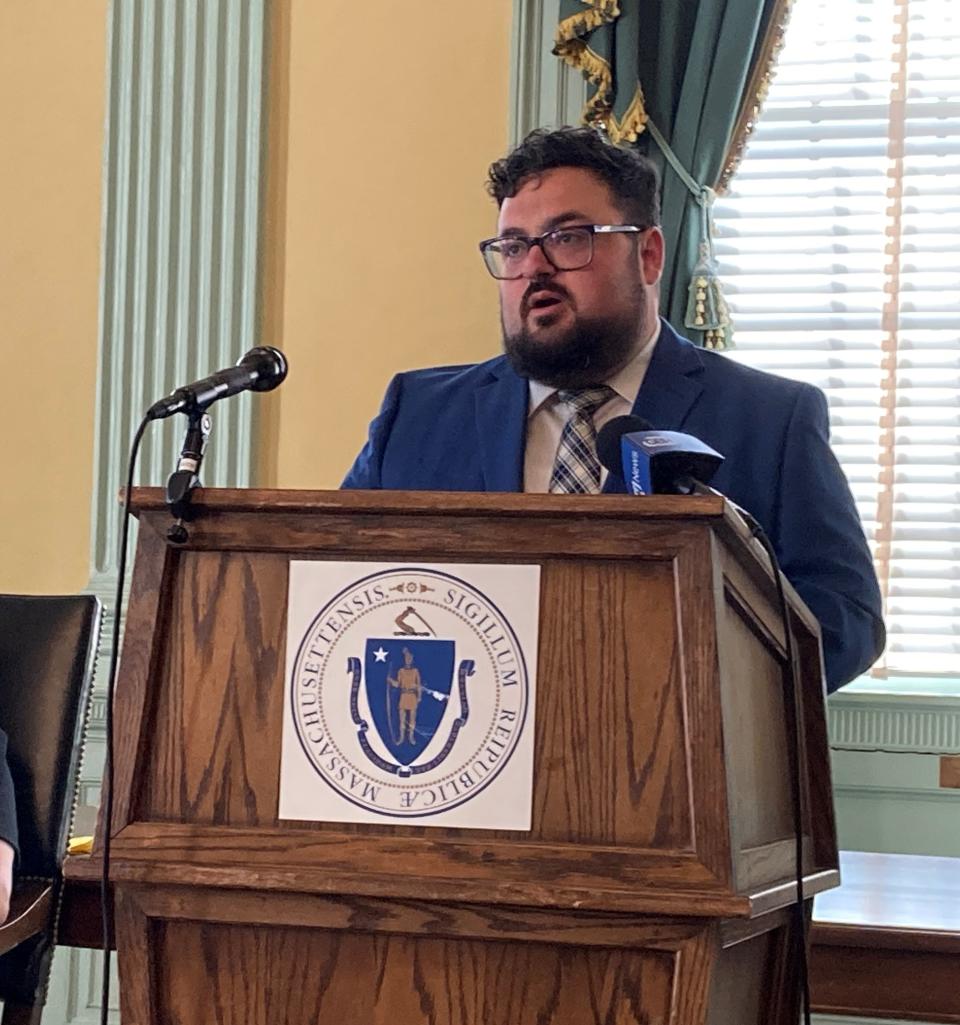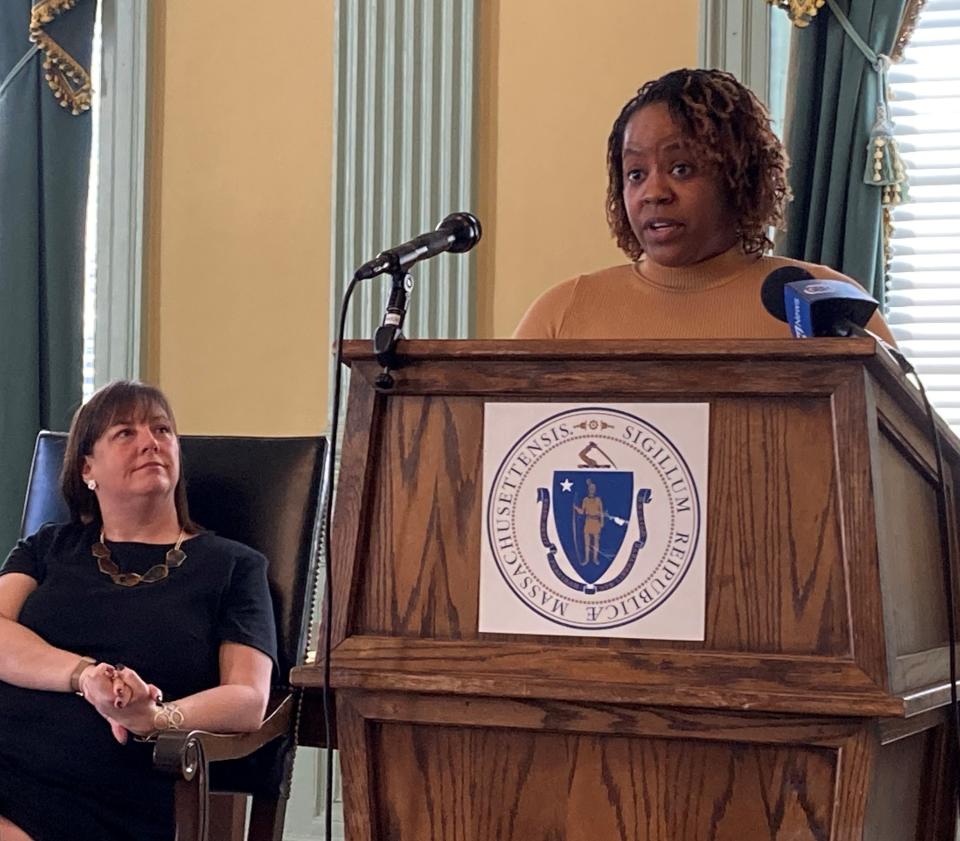Two bills could help Mass. fix child care problems by boosting wages, accessibility
BOSTON — Without legislative action to fund grants, increase wages for early childhood education workers and open the door for more families to qualify for financial assistance to pay for care, Massachusetts stands to lose its dedicated pre-K teaching workforce.
“Teachers can’t afford to do the job,” said Jarred Rose, pre-K teacher in Stoughton and co-chair of the Massachusetts chapter of the National Association for the Education of Young Children.
Rose said he's seen teachers leave their jobs and even leave Massachusetts because they can no longer afford housing, commuting and living costs. “Our teachers love their jobs, love working with children, but can’t afford to do it anymore.”
Rose, who went from a position in the state Senate as a legislative aide to his current position as a teacher, was speaking at an information session in support of two bills Wednesday.

The bills would provide direct funding to care centers and increase workers' wages. The measures would also provide financial assistance to more families seeking care for their offspring. The state estimates that 16,000 children are on waiting lists for placement in early education centers. The nuts and bolts of the funding sources and delivery of financial aide to centers was not addressed in either bill.
The sponsor of the House bill, Kenneth Gordon, D-Bedford, told the State House News Service that the support for the measure is clear.
"I think it's a priority for all of us. It's a question of looking into the details about where the funding comes from, how it's going to be organized and arranged and really just the 'how to's.' It's not about the 'should we's.' It's the 'how to's,'" Gordon said.
Instability in child care worsens outcomes for youngsters
“I work with 5-year-olds teaching them how to read, make friends, do math and understand the world around them,” Rose said. He said inconsistency and instability in the early childhood education field has a devastating effect on youngsters. The constant shift in care providers he sees in his own workplace translates to children losing trust in adults.
“When there’s no continuity in the classroom, children aren’t learning their lessons,” Rose said. Three of his colleagues left the field in the last two months. “It’s the children who are hurt at the end of the day.”
The information session was hosted by Common Start Coalition, a group of more than 150 organizations leading a campaign to address the early childhood education and child care crisis.
Legislation funds centers, opens voucher accessibility
“Our mission is to ensure that all families have the care solutions they need and that all children in our commonwealth have the same strong start and enter school on a level playing field,” said Amy O’Leary, executive director of Strategies for Children. “We know there is strong support for Common Start’s vision and policy proposals, and we are excited to work with the Legislature to pass comprehensive early education and child care legislation this year.”

The proposed legislation, one bill filed in the Senate, the other in the House, would establish permanent funding that would be allocated directly to care providers based on a center’s capacity. The measures would offset provider costs including higher salaries for teachers, bringing them to par with teachers in the public school system. The measures would also offer provider grants, similar to the Commonwealth Cares for Children program.
The Senate unanimously passed a similar measure in the last legislative session; however, it failed to pass both houses. Both legislative leaders, Senate President Karen Spilka, D-Ashland, and House Speaker Ronald Mariano, D-Quincy, indicated that assistance for early education would be a priority for them. Currently, 81 representatives and 23 senators have signed on as co-sponsors of the bills filed by Sens. Jay Lewis, D-Winchester, and Susan Moran, D-Falmouth, and Rep. Adrian Madaro, D-Boston, with Gordon.
The proposed bills, "An Act providing affordable and accessible high-quality early education and care to promote child development and well-being and support the economy in the commonwealth," would also provide families with financial assistance to unlock high-quality care opportunities. At first, families living at or below 85% of the state median income would be prioritized. Massachusetts median income, according to the U.S. Census Bureau, reached $89,026 in 2021. A family of two people would qualify for assistance earning a salary of $78,571 a year. The parent would be eligible for child care vouchers.
Slight differences in the proposed legislation would open subsidies to middle-income families as federal funding becomes available. The House bill would allow families living at 125% of the state’s median income to apply for vouchers. The Senate bill would open the voucher availability to families making 200% of the state’s median income.
Mass. has highest child care costs in US
Massachusetts has the highest child care costs in the nation, according to the Economic Policy Institute, ranging between $16,000 and $20,000 per child per year, depending on the age of the child. According to the Massachusetts Institute of Technology living wage calculator, a single parent with one child must earn $45.57 an hour, or $94,785 (pre-taxes) a year, to be able to afford to live in the state, pay for housing, child care, food, transportation and incidental costs.
Tiffany Jenkins of Hyde Park stayed home with her daughter for two years while waiting for a voucher that would allow her to enroll the girl in a care center.
“It wasn’t easy to get a voucher and there was a long waiting list,” Jenkins said. A single mother, she works as a concierge at a local hospital, has completed her associate degree in business and is now seeking a four-year degree at Endicott College. She also studies carpentry.
A way out of poverty
“I have child care now,” Jenkins said. She detailed the difficulties she experienced in her quest for a child care voucher including the mountains of paperwork, the lack of communication and the lack of assistance when she was searching for openings and availability.
Jenkins also detailed some of the benefits of having consistent, affordable child care. The financial assistance allows her to pursue her own education, allows her to complete her daily tasks (housework, shopping, studying) while it enhances her daughter’s educational preparedness for elementary school and allows her to socialize with other children.
“It will help me get out of poverty,” Jenkins said of the child care voucher.
This article originally appeared on Telegram & Gazette: Without guaranteed funding, Mass. could lose early childhood educators

